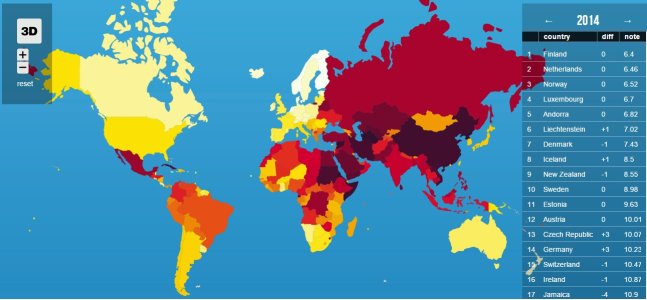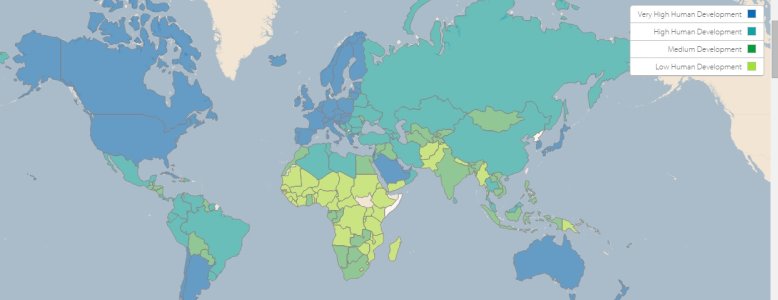Buffet
Post of the Week winner
- Joined
- Aug 1, 2011
- Runs
- 27,433
- Post of the Week
- 3
.
Press freedom - World map [ Darker color means less freedom. ]

.
Countries that pride themselves on being democracies and respecting the rule of law have not set an example, far from it. Freedom of information is too often sacrificed to an overly broad and abusive interpretation of national security needs, marking a disturbing retreat from democratic practices. Investigative journalism often suffers as a result.
- The United States (46th), which fell 13 places, one of the most significant declines, amid increased efforts to track down whistleblowers and the sources of leaks.
- The United Kingdom (33rd, -3) distinguished itself in the war on terror by the disgraceful pressure it put on The Guardian newspaper.
- US and UK authorities seem obsessed with hunting down whistleblowers instead of adopting legislation to rein in abusive surveillance practices that negate privacy, a democratic value cherished in both countries.
- Despite its regional aspirations, Turkey (154th) registered no improvement and continues to be one of the world’s biggest prisons for journalists.
- China (175th, -1) failed to improve its ranking because, despite having an astonishing vital and increasingly militant blogosphere, it continues to censor and jail dissident bloggers and journalists.
- India (140th, +1) experienced an unprecedented wave of violence against journalists, with eight killed in 2013. They are targeted by both state and non-state actors.
Organized crime is a fearsome predator for journalists in many parts of the world, especially Honduras (129th, -1), Guatemala (125th, -29), Brazil (111th, -2) and Paraguay (105th, -13), but also Pakistan, China, Kyrgyzstan and the Balkans. In organized crime’s shadow, it is hard if not impossible to refrain from self-censorship on such sensitive subjects as drug-trafficking, corruption and criminal penetration of the state apparatus.
NOTEWORTHY RISES
Violence against journalists, direct censorship and misuse of judicial proceedings are on the decline in Panama (87th, +25), Dominican Republic (68th, +13), Bolivia (94th, +16) and Ecuador (94th, +25), although in Ecuador the level of media polarization is still high and often detrimental to public debate.
http://rsf.org/index2014/en-index2014.php
---------------------------------------
Some countries have always suppressed the freedom of press but it's troubling to see countries like US and UK using national security to curb the freedom of press. Over all freedom in world should go up rather than going down but larger countries needs to do a better job.
Press freedom - World map [ Darker color means less freedom. ]

.
Countries that pride themselves on being democracies and respecting the rule of law have not set an example, far from it. Freedom of information is too often sacrificed to an overly broad and abusive interpretation of national security needs, marking a disturbing retreat from democratic practices. Investigative journalism often suffers as a result.
- The United States (46th), which fell 13 places, one of the most significant declines, amid increased efforts to track down whistleblowers and the sources of leaks.
- The United Kingdom (33rd, -3) distinguished itself in the war on terror by the disgraceful pressure it put on The Guardian newspaper.
- US and UK authorities seem obsessed with hunting down whistleblowers instead of adopting legislation to rein in abusive surveillance practices that negate privacy, a democratic value cherished in both countries.
- Despite its regional aspirations, Turkey (154th) registered no improvement and continues to be one of the world’s biggest prisons for journalists.
- China (175th, -1) failed to improve its ranking because, despite having an astonishing vital and increasingly militant blogosphere, it continues to censor and jail dissident bloggers and journalists.
- India (140th, +1) experienced an unprecedented wave of violence against journalists, with eight killed in 2013. They are targeted by both state and non-state actors.
Organized crime is a fearsome predator for journalists in many parts of the world, especially Honduras (129th, -1), Guatemala (125th, -29), Brazil (111th, -2) and Paraguay (105th, -13), but also Pakistan, China, Kyrgyzstan and the Balkans. In organized crime’s shadow, it is hard if not impossible to refrain from self-censorship on such sensitive subjects as drug-trafficking, corruption and criminal penetration of the state apparatus.
NOTEWORTHY RISES
Violence against journalists, direct censorship and misuse of judicial proceedings are on the decline in Panama (87th, +25), Dominican Republic (68th, +13), Bolivia (94th, +16) and Ecuador (94th, +25), although in Ecuador the level of media polarization is still high and often detrimental to public debate.
http://rsf.org/index2014/en-index2014.php
---------------------------------------
Some countries have always suppressed the freedom of press but it's troubling to see countries like US and UK using national security to curb the freedom of press. Over all freedom in world should go up rather than going down but larger countries needs to do a better job.






